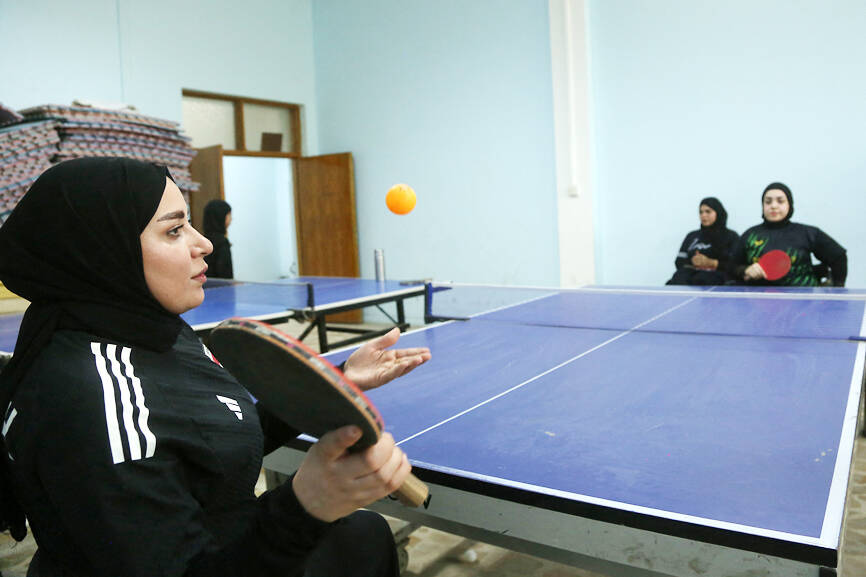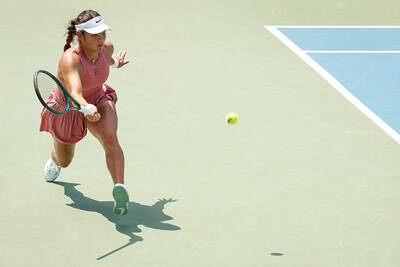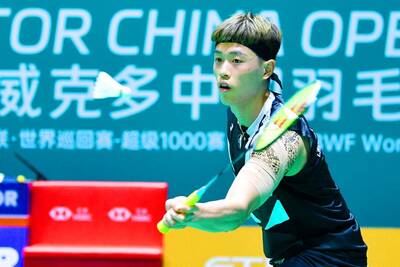Iraqi table tennis player Nur al-Huda Sarmad adjusts her wheelchair before striking the ball into play, braving sweltering heat, social stigma and inadequate facilities as she dreams of taking her team to the Paralympics.
Sarmad and seven other Iraqi women who live with disabilities train three times a week at a community center in the southern Iraqi city of Diwaniyah, preparing for an upcoming tournament that could qualify them for the national Paralympic team.
The facilities are far from Olympic-standard.

Photo: AFP
“The tennis tables are broken, there are power outages and we even have to buy our own paddles,” said Sarmad, 25.
With no dedicated training facility, the team often has to share the three second-hand tables at the public community center with visitors.
In the scorching Iraqi summer they cannot turn on the fans, which would disrupt the movement of the balls.
The air conditioner that could provide some relief remains off-limits in a country grappling with chronic power cuts, especially in summer when temperatures approach 50°C. The center is powered by a generator, but it can barely sustain the essentials.
These practical issues “affect our training” and hinder the players’ progress, Sarmad said.
The team also faces insufficient government funding for sports, and conservative views on women’s rights and people with disabilities.
Paralympic champion Najlah Imad, the first Iraqi to snare a gold medal in table tennis, said that “despite the difficult circumstances, nothing is impossible.”
Imad, who now relies on sponsorship deals, encouraged her fellow players to keep fighting.
“You can do anything,” she said.
Sarmad, who has already won several medals including bronze in a tournament in Thailand, takes pride in the fact that despite the many challenges, “we overcame all this, we became players.”
The state-owned community center provides the team a stipend equivalent to US$75 per month to cover transportation costs, but the players had to purchase their professional paddles — at a cost of US$200 — out of their own pockets.
The players often have to rely on taxis to travel to training sessions, but “sometimes cabs refuse to take disabled people,” Sarmad said.
Coach Mohammed Riyad, 43, said that table tennis “has developed in Diwaniyah solely through personal efforts... due to the lack of support from the state.”
Riyad, a member of the Iraqi Paralympic Committee, said that funding sports was not a priority in a country where decades of conflicts, neglect and endemic corruption have devastated infrastructure.
Through the Paralympic Committee, he has managed to acquire old equipment for Sarmad and her fellow players.
He said that “the state only focuses on football, despite the achievements of table tennis players” like Imad, who brought home the Paralympic gold from last year’s Paris Games.
Iraq has a long tradition of women’s sports, with teams competing in regional soccer, weightlifting and boxing tournaments.
However, there is also vocal opposition seeking to exclude women and bar mixed-gender events.
In southern Iraq, a largely conservative area where Sarmad’s team is based, organizers of a marathon last year made it a men-only event after a social media controversy over women’s participation in sports.
Iraqis living with disabilities often face additional challenges amid a general lack of awareness about their rights and inclusion.
For award-winning table tennis player Iman Hamza, 24, society mistakenly sees women with disabilities like her “as helpless people who cannot do anything.”
“But we became world champions,” she said.

Shohei Ohtani on Wednesday homered for the fifth consecutive game, tying a Los Angeles Dodgers franchise record. Yankees star Aaron Judge was the last player to homer in five consecutive games, accomplishing that feat last year. Ohtani, who leads the National League with 37 home runs, homered in the first inning off Minnesota Twins starter Chris Paddack. He hit a slow curveball 134m to center. He carried the bat midway down the first-base line and then did a bat flip. He did not hit a home run later in the game with the Dodgers trailing, but his presence was felt. With two outs

US top seed Taylor Fritz dropped an early yesterday morning marathon to Alejandro Davidovich-Fokina of Spain, while the UK’s Emma Raducanu and Canada’s Leylah Fernandez reached the semi-finals of the ATP and WTA DC Open. World number four Fritz, two points from victory in the ninth game, dropped the last five games in falling to the 26th-ranked Spaniard 7-6 (7/3), 3-6, 7-5 after three hours and five minutes in a match ending just before 2am. Davidovich-Fokina advanced to the semi-final against US fourth seed Ben Shelton, who beat sixth-seeded hometown hero Frances Tiafoe 7-6 (7/2), 6-4. Fritz, who had 20 aces and six

Taiwan’s world No. 6 shuttler Chou Tien-chen yesterday defeated India’s H.S. Prannoy to advance to the quarter-finals of the China Open in Changzhou. It was former world No. 2 Chou’s eighth win in 14 matches against Prannoy, who had earlier this week lamented the age divide between him and up-and-comers, although he is only two years younger than 35-year-old Chou. The Taiwanese, who is seeded sixth at the tournament, rebounded from a close 21-18 loss in game 1 on Court 2 at the Olympic Sports Center Gymnasium. He bounced back to take the next games 21-15, 21-8 and set up a tough quarter-final

Ben O’Connor won Thursday’s monster Alpine stage to the ski resort of Courchevel as three-time Tour de France champion Tadej Pogacar responded to attacks from Jonas Vingegaard and dropped him to cement his grip on the yellow jersey. With just three stages left before the race ends in Paris, Pogacar looks poised to retain his title, with a comfortable lead of more than 4 minutes over Vingegaard, a two-time champion. Stage 18 featured three extremely difficult ascents, including the 26.4km climb of the Col de La Loze to the finish. At 2,304m, La Loze is the highest summit in this year’s Tour. Two